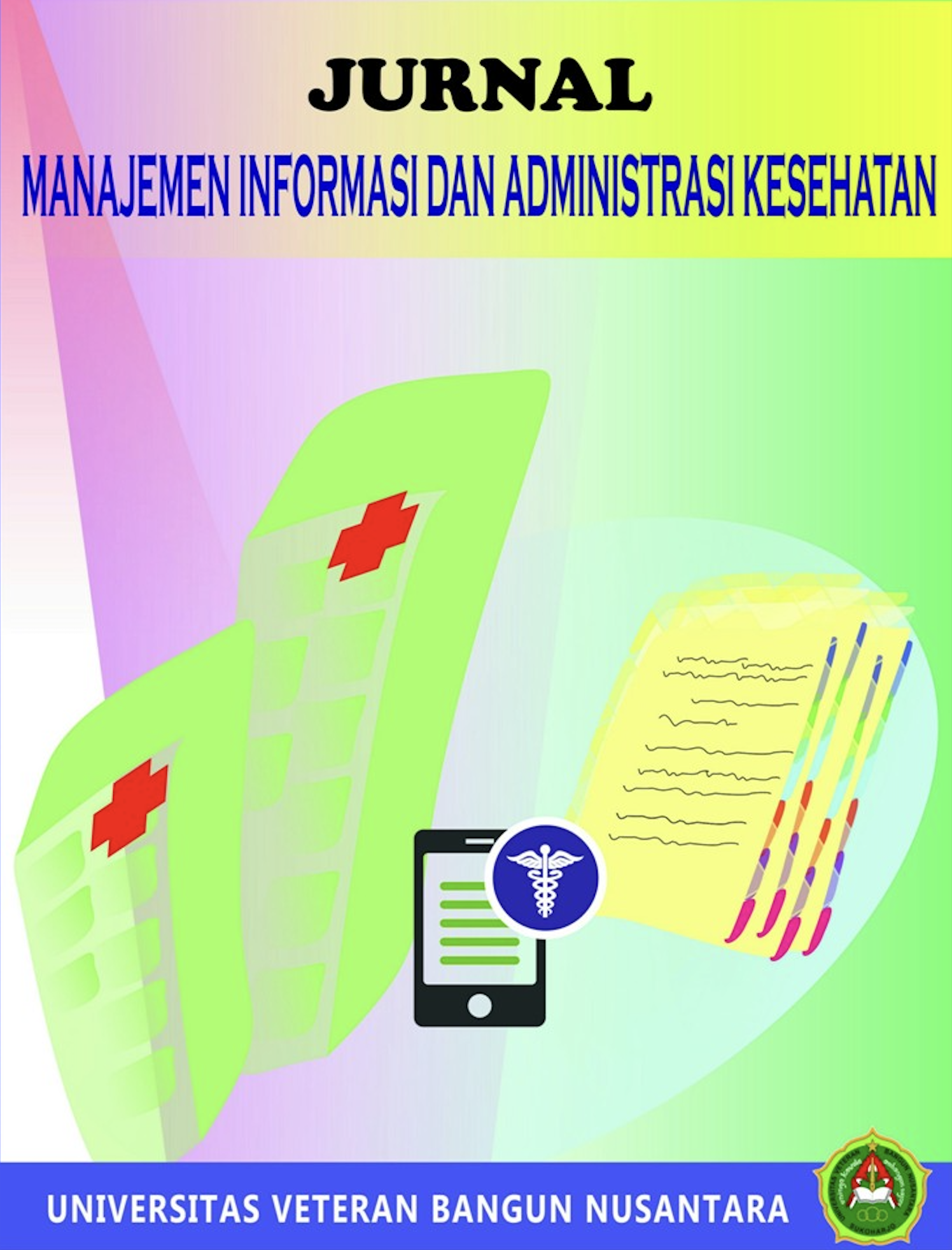AKURASI KODE ICD-10 KASUS PEMERIKSAAN KEHAMILAN PADA REKAM MEDIS ELEKTRONIK
DOI:
https://doi.org/10.32585/jmiak.v4i2.2015Keywords:
ICD-10, akurasi, kode diagnosis, rekam medis elektronikAbstract
Akurasi kode klinis penting untuk evaluasi kualitas layanan kesehatan, penagihan klaim biaya, penelitian, dan pelaporan. Kode yang akurat akan menghasilkan data dan informasi yang berkualitas. Pemeriksaan kehamilan merupakan kondisi terbanyak yang ditangani di Klinik Obstetri dan Ginekologi dan ditemukan 60% ketidakakuratan kode. Penelitian bertujuan untuk menganalisis akurasi kode pemeriksaan kehamilan berdasarkan ICD-10. Penelitian ini merupakan mixed method sequential explanatory (kuantitatif-kualitatif) dengan rancangan cross sectional. Sampel penelitian berupa objek terdiri dari 138 data pasien yang terpilih menggunakan teknik total sampling. Subyek penelitian 1 orang coder dan 1 orang dokter yang terpilih melalui teknik purposive sampling. Pengumpulan data dilakukan melalui studi dokumentasi dan wawancara. Instrumen penelitian menggunakan lembar studi dokumentasi dan pedoman wawancara. Analisis data kuantitatif menggunakan analisis univariat dan analisis data kualitatif menggunakan content analysis. Akurasi kode pemeriksaan kehamilan pada kategori akurat sampai 3 digit sebesar 22,4% dan tidak akurat sebesar 77,6%. Ketidakakuratan kode pemeriksaan kehamilan disebabkan oleh ketidaksesuaian kualifikasi SDM, pemilihan diagnosis dan kode hanya berdasarkan kondisi saat pasien melakukan pemeriksaan, dan kode diagnosis pada database rekam medis elektronik belum lengkap. Untuk meningkatkan akurasi kode perlu dilakukan pelatihan ICD-10 untuk dokter, dokter atau bidan melakukan review kondisi dan riwayat lain pasien, audit kode secara berkala, dan melengkapi database pada rekam medis elektronik sesuai ICD-10.
Downloads
References
Campanella, P., Lovato, E., Marone, C., Fallacara, L., Mancuso, A., Ricciardi, W., Specchia, M.L., 2016. The Impact of Electronic Health Records on Healthcare Quality: A Systematic Review and Meta-Analysis. Eur. J. Public Health 26, 60–64.
Creswell, J.W., 2014. Research Design : Qualitative, Quantitative, and Mixed Method Approach. Sage Publications, Inc, London.
Dyers, R., Ward, G., du Plooy, S., Fourie, S., Evans, J., Mahomed, H., 2017. Training and Support to Improve ICD Coding Quality: A controlled Before-and-After Impact Evaluation. South African Med. J. 107, 501–506.
Feder, S.L., 2018. Data Quality in Electronic Health Records Research: Quality Domains and Assessment Methods. West. J. Nurs. Res. 40, 753–766.
Hatta, G.R., 2013. Pedoman Manajemen Informasi Kesehatan di Sarana Pelayanan Kesehatan. Penerbit Universitas Indonesia., Jakarta.
Horsky, J., Drucker, E.A., Ramelson, H.Z., 2017. Accuracy and Completeness of Clinical Coding Using ICD-10 for Ambulatory Visits. AMIA ... Annu. Symp. proceedings. AMIA Symp. 2017, 912–920.
Hosseini, N., Kimiafar, K., Mostafavi, S.M., Kiani, B., Zendehdel, K., Zareiyan, A., Eslami, S., 2021. Factors Affecting the Quality of Diagnosis Coding Data with A Triangulation View: A Qualitative Study. Int. J. Health Plann. Manage. 36, 1666–1684.
Kiongo, J., Yitambe, A., Otieno, G., 2020. Improving the Quality of Clinical Coding through the Training of Health Records and Information Officers in Selected Hospitals , Nairobi City Abstract 6, 1–11.
Opitasari, C., Nurwahyuni, A., 2018. The Completeness and Accuracy of Clinical Coding for Diagnosis and Medical Procedure on the INA-CBGs Claim Amounts at a Hospital in South Jakarta. Heal. Sci. J. Indones. 9, 14–18.
WHO, 2016. International Statistical Classification of Diseases and Ralated Health Problems Tenth Revision (ICD-10). WHO, Geneva.
Downloads
Published
Issue
Section
License
The copyright to this article is transferred to Jurnal Manajemen Informasi dan Adminstrasi Kesehatan (JMIAK) if and when the article is accepted for publication under Creative Commons Attribution-ShareAlike 4.0 International License. The undersigned hereby transfers any and all rights in and to the paper including without limitation all copyrights to Jurnal Manajemen Informasi dan Adminstrasi Kesehatan (JMIAK). The undersigned hereby represents and warrants that the paper is original and that he/she is the author of the paper, except for material that is clearly identified as to its original source, with permission notices from the copyright owners where required. The undersigned represents that he/she has the power and authority to make and execute this assignment.
We declare that:
1. This paper has not been published in the same form elsewhere.
2. It will not be submitted anywhere else for publication prior to acceptance/rejection by this Journal.
3. A copyright permission is obtained for materials published elsewhere and which require this permission for reproduction.
Furthermore, I/We hereby transfer the unlimited rights of publication of the above mentioned paper in whole to Jurnal Manajemen Informasi dan Adminstrasi Kesehatan (JMIAK). The copyright transfer covers the right to reproduce and distribute the article, including reprints, translations, photographic reproductions, microform, electronic form (offline, online) or any other reproductions of similar nature. The corresponding author signs for and accepts responsibility for releasing this material on behalf of any and all co-authors. After submission of this agreement signed by the corresponding author, changes of authorship or in the order of the authors listed will not be accepted.
Retained Rights/Terms and Conditions
1. Authors retain all proprietary rights in any process, procedure, or article of manufacture described in the work.
2. Authors may reproduce or authorize others to reproduce the work or derivative works for the author’s personal use or for company use, provided that the source and the Jurnal Manajemen Informasi dan Adminstrasi Kesehatan (JMIAK) copyright notice are indicated, the copies are not used in any way that implies Jurnal Manajemen Informasi dan Adminstrasi Kesehatan (JMIAK)l endorsement of a product or service of any employer, and the copies themselves are not offered for sale.
3. Although authors are permitted to re-use all or portions of the work in other works, this does not include granting third-party requests for reprinting, republishing, or other types of re-use.








